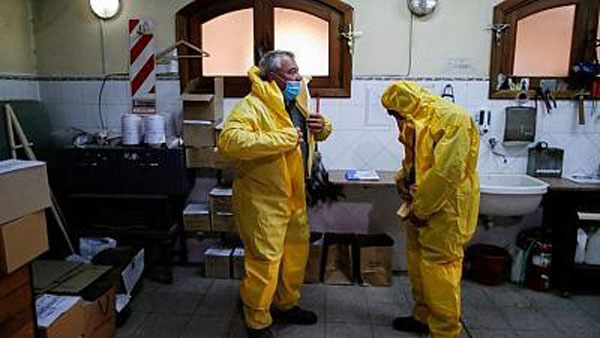BUENOS AIRES, (Reuters) – For lawyer Lidia Alverisi, Argentina’s COVID-19 pandemic has taken an almost unbearable toll.
“We have all lost someone, someone we knew well,” she told Reuters. “In my case, it’s been friends I’ve known for 40 years who were gone in just 10 days.”
The South American country is engulfed in a second wave of the virus that started in mid-February and is pushing hospitals close to saturation point and its citizens to despair.
By late yesterday, Argentina had confirmed 80,411 deaths among its 45 million citizens from the disease, with a total 3.9 million cases.
At present it ranks the third-highest in the world for average daily cases, with more total recorded per capita cases than regional giant Brazil.
The government has struggled to find a balance between lockdowns and keeping the already embattled economy going, as well as driving a vaccine campaign that was slow to start and medics say won’t manage to drive down infection rates for several months.
“I think deaths could have been avoided if the government had focused more on vaccines and if people had respected the lockdowns more,” said student Martina Dawin, 17. Others however, think the government’s priority should have been shielding people from more economic hardship after three straight years of recession.
Diego Peralta said he had voted for Argentina´s leftist President Alberto Fernandez but had lost faith because of the extended lockdowns. “I feel bad for my fellow citizens going through a bad time, but COVID-19 is secondary when there’s no food to give your child,” he said.
Argentina is inoculating its citizens against COVID-19 with Russia’s Sputnik V vaccines, the AstraZeneca jab developed with Oxford University and Chinese-made Sinopharm.
Since the campaign started on Christmas Eve last year, the country has carried out 13.4 million inoculations, though only around 3 million people have received the full double dose.
Argentina’s health minister Carla Vizzotti insisted that although the number of deaths remained alarming, the decline in the number of over 60s, who received vaccines first, among them was a sign the country was moving in the right direction.
Infectious diseases specialist Dr. Roberto Debbag said there was still some way to go.
“We will have high or medium-high numbers until more than 30 or 40 percent of the population has been vaccinated with two doses,” he said. “I don’t think that will happen in the space of the next three months.”

